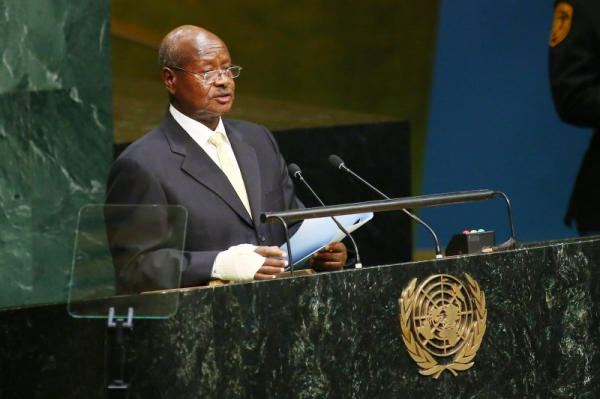
Ugandan activist said on Monday that will challenge an anti-homosexuality law signed into law by President Yoweri Kaguta Museveni earlier this year in court. File Photo by Monika Graff/UPI | License Photo
Ugandan activists said on Monday that they will challenge the country’s Anti-Homosexual Act in court, charging that it violates the country’s constitution and international human rights standards.
The protesting group, which includes academics, attorneys, human rights activists, and journalists, said that the current law, signed by President Yoweri Kaguta Museveni in May, not only sweeps up members of the LGBTQ community with harsh punishments but their allies as well. Advertisement
“The Anti-Homosexuality Act, is one of the world’s harshest anti-LGBT laws and includes the death penalty for ‘serial offenders ‘ or for anyone having same-sex relations with a person with a disability, a child, or of advanced aged, among others, under the offense of ‘aggravated homosexuality,'” Human Rights Watch said in a statement.
The organization said the law also uses vague language that targets the “promotion of homosexuality” and anyone advocating for the rights of LGBTQ people with prison terms of up to 20 years.
“We are challenging the Anti-Homosexuality law because it does not pass any constitutional litmus test, and we shall win, because such an abhorrent law whose only aim is to spread hate and institutionalize discrimination and exclusion does not belong on Uganda’s lawbooks and should never have been enacted in the first place,” Clare Byarugaba, a Ugandan LGBTQ advocate said. Advertisement
The law was passed with strong support from parliament in Merch.
In May, Ugandan Parliament Speaker Anita Annet Among called those opposing Uganda’s strict anti-homosexuality law “bullies and doomsday conspiracy theorists.” Among said the law was passed “in the interest of our country.”
It, however, has drawn strong condemnation from international observers.
The World Bank announced in August that it had suspended its lending programs for Uganda in response to the law. The bank said that it will no longer consider new public financing proposals because it does not discriminate against or exclude sexual or gender minorities.
Last week, the United States expanded visa restrictions against Uganda in response to the law, expanding them to include Ugandan officials or others “believed to be responsible for, or complicit in, undermining the democratic process in Uganda or for policies or actions aimed at repressing members of marginalized or vulnerable populations.”